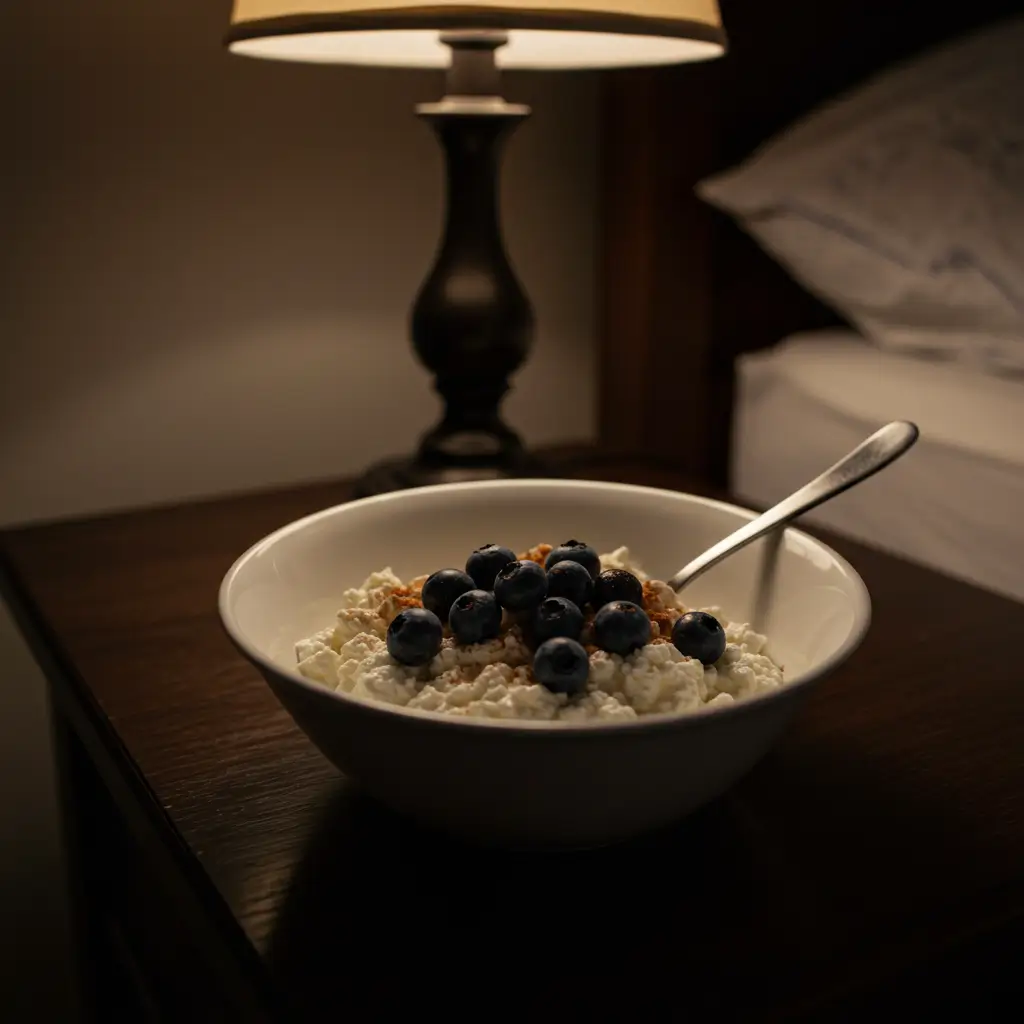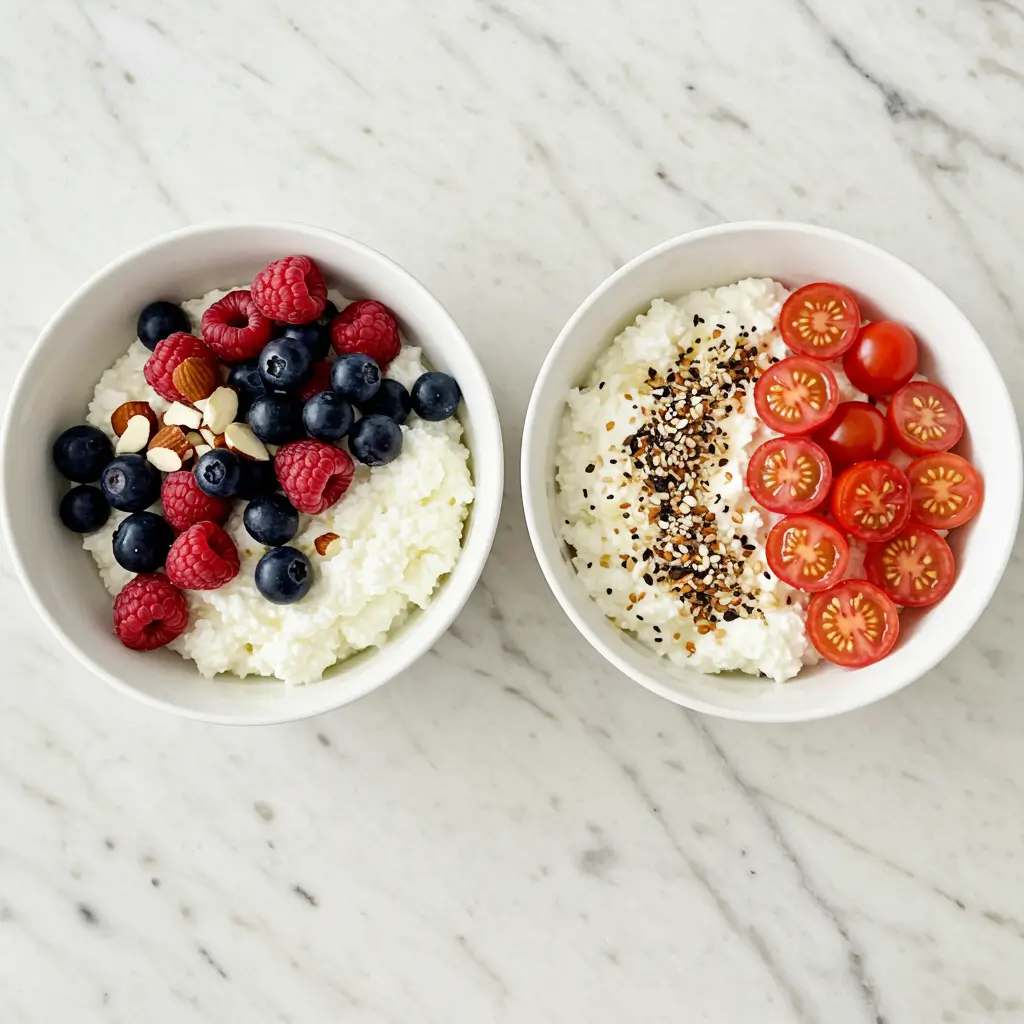
Cottage cheese before bed might sound like an old-school diet tip, but this simple practice is making a major comeback for good reason. Whether your goal is to build lean muscle, shed a few pounds, or simply improve your overnight recovery, this humble dairy snack packs a powerful scientific punch. We’re diving deep into why this nighttime ritual works, how to do it right, and how to make it a delicious part of your routine. We will explore the science behind its benefits, provide the perfect protocol for your goals, and even share some tasty recipes. For a complete breakdown of its nutritional profile, start with our cottage cheese macros guide.
Table of Contents
Table of Contents
The Science: Why Cottage Cheese Before Bed Works
You might wonder, “Is it good to eat cottage cheese before bed?” The answer lies in the unique way your body recovers while you sleep and the specific type of protein found in this snack.
Sleep and Muscle Protein Synthesis
When you sleep, your body gets to work repairing itself. A key part of this process is muscle protein synthesis (MPS), where your body uses amino acids from protein to repair and build muscle fibers that were challenged during the day. Providing your body with a steady supply of these building blocks overnight can dramatically enhance this recovery process. Without adequate protein, your body can enter a catabolic (breakdown) state, potentially undoing some of your hard work from the gym.
Casein’s Slow-Release Properties
This is where cottage cheese shines. Unlike whey protein, which digests rapidly, cottage cheese is about 80% casein protein. Casein forms a gel-like substance in your stomach, leading to a much slower digestion and absorption rate. This creates a “trickle-feed” of amino acids into your bloodstream for up to 7-8 hours. This sustained release is perfect for fueling MPS all night long, making it an ideal choice for anyone looking to optimize muscle growth. For more on this, explore how to use cottage cheese for muscle building.
Growth Hormone and Recovery
Your body naturally releases a significant pulse of human growth hormone (HGH) during the first few hours of deep sleep. HGH plays a vital role in cellular repair, metabolism, and muscle growth. The amino acids provided by the casein in cottage cheese give your body the raw materials it needs to take full advantage of this natural anabolic window, further amplifying your recovery.
Research Findings on Nighttime Protein
Studies back this up. Research from Maastricht University published in Frontiers in Nutrition found that consuming 40 grams of casein protein before sleep increased muscle protein synthesis rates by approximately 22% during overnight sleep compared to a placebo. The study demonstrated that protein ingested prior to sleep is effectively digested and absorbed during sleep, increasing plasma amino acid availability throughout the night (Snijders et al., 2019). This helps improve the overall protein balance in your body, leading to better recovery and muscle adaptation over time. The benefits of eating cottage cheese before bed are rooted in this powerful biological synergy.

How to Eat Cottage Cheese Before Bed: Your Optimal Protocol
To get the most out of your nighttime snack, you need to consider timing, portion size, and what you pair it with.
Timing Recommendations
You don’t want to go to bed feeling overly full. Aim to eat your cottage cheese 30 to 60 minutes before you plan to sleep. This gives your digestive system a head start without interfering with your ability to fall asleep comfortably.
Portion Sizes for Different Goals
For Muscle Building: A full cup (around 200-225g) is a common recommendation in the bodybuilding community. This provides a robust 25-28 grams of slow-digesting protein. A systematic review in the Journal of Science and Medicine in Sport concluded that consuming 20-40 grams of casein approximately 30 minutes before sleep improves the protein synthetic response during overnight recovery in healthy young adults, with demonstrated positive effects on muscle mass and strength following prolonged resistance exercise (Reis et al., 2021).
For Weight Loss: A smaller portion of a half-cup (around 100-115g) is often sufficient. This delivers 12-14 grams of protein, which helps maintain muscle mass and boost satiety without adding excessive calories. Some people even find that 2 tablespoons of cottage cheese before bed is enough to curb hunger.
General Health: A half-cup is a great starting point for general recovery and to prevent late-night cravings.
Combining with Other Nutrients
While delicious on its own, you can enhance the benefits by adding other nutrients. A small handful of almonds can add healthy fats and magnesium, which aids in sleep. A drizzle of honey (honey and cottage cheese before bed is a classic!) can help replenish glycogen stores, especially after a tough workout. Just be mindful of sugar if weight loss is your primary goal. For those on specific diets, it’s worth noting that it can fit many plans, including low-carb. Find out more by asking, “is cottage cheese keto friendly?“
Digestive Considerations
Choose a plain, low-sodium cottage cheese to avoid unnecessary additives and water retention. If you are sensitive to dairy, start with a very small portion to see how your body reacts. Look for brands with live and active cultures, as they can be easier on your digestive system. Check out our guide to the healthiest cottage cheese brands to make a smart choice at the store.
Simple and Delicious Cottage Cheese Before Bed Recipes
Forget boring, bland snacks. Your nighttime cottage cheese before bed recipe can be something you look forward to. Here are a few quick and easy ideas.
The Sweet & Sleepy Bowl
This combination is perfect for satisfying a sweet tooth while promoting relaxation.
- Ingredients: 1/2 to 1 cup cottage cheese, 1/4 cup mixed berries (fresh or frozen), 1 tablespoon chopped walnuts or almonds, a sprinkle of cinnamon.
- Why it works: Berries provide antioxidants, nuts add healthy fats and magnesium, and cinnamon helps regulate blood sugar. It’s a balanced, sleep-friendly treat.
The Savory Dream

If you lean more toward savory snacks, this one is for you.
- Ingredients: 1/2 to 1 cup cottage cheese, a pinch of black pepper, a sprinkle of everything bagel seasoning, a few slices of cucumber or tomato.
- Why it works: It’s low in sugar and highly satisfying. The seasoning adds a burst of flavor without calories, and the fresh vegetables add a pleasant crunch.
Quick Preparation & Make-Ahead Options
Your pre-bed routine should be simple. The easiest method is to just scoop some cottage cheese into a bowl and eat it plain. For a grab-and-go option, you can pre-portion cottage cheese into small containers at the beginning of the week. Mix in some protein powder for an extra boost or some natural peanut butter for healthy fats. This way, your healthy snack is always ready when you are.
Tailoring Your Snack: Special Considerations
Your individual goals and body chemistry play a huge role in how you should approach this habit.
Weight Loss vs. Muscle Building Approaches
The primary difference lies in the portion size and additions.
- For Weight Loss: Stick to smaller portions (1/2 cup) and avoid adding high-calorie extras like honey or large amounts of nuts. The high protein content will keep you full, preventing you from waking up hungry. This makes eating cottage cheese before bed to lose weight an effective strategy for calorie management. Learn more about cottage cheese for cutting.
- For Muscle Building: Use a larger portion (1 cup) to maximize the protein dose. Feel free to add calorie-dense and nutrient-rich toppings like fruit, nuts, or a scoop of casein protein powder to further support growth.
Age-Related Recommendations
As we age, we naturally lose muscle mass (a condition called sarcopenia). A nighttime protein snack becomes even more important for older adults to help preserve muscle and bone density. The calcium in cottage cheese is an added bonus for bone health. Cottage cheese is packed with essential nutrients, which you can read about in our guide to cottage cheese vitamins and minerals.
Digestive Sensitivity Management
If you experience bloating, try a lactose-free cottage cheese brand. Alternatively, start with a very small amount, like one or two tablespoons, and see how your body responds before increasing the portion. Ensuring your cottage cheese contains probiotics can also aid digestion.
Troubleshooting Your Nighttime Snack
What if it’s not working perfectly for you? Let’s optimize.
If you feel bloated or uncomfortable, your portion might be too large or you might be eating it too close to bedtime. Try reducing the amount or having it a full 60-90 minutes before you lie down. Remember that this snack is a tool, not a magic bullet. It works best when combined with a solid overall diet and consistent exercise. For it to be effective for sleep, you must also practice good sleep hygiene: keep your room dark and cool, and avoid screens before bed. Listen to your body and adjust as needed for long-term success.
The Overnight Power of Cottage Cheese
- (Icon of a Clock): The Casein Advantage
- Features slow-digesting casein protein.
- Provides a steady stream of amino acids for 7-8 hours.
- Prevents muscle breakdown while you sleep.
- (Icon of a Flexing Bicep): Fuel for Muscle Repair
- Directly fuels Muscle Protein Synthesis (MPS).
- Supplies the building blocks your body needs for recovery.
- Maximizes results from your workouts.
- (Icon of a Flame): Metabolism & Satiety Boost
- High protein content has a greater thermic effect of food (burns more calories during digestion).
- Keeps you feeling full, preventing late-night cravings.
- (Icon of a Growth Chart): Synergizes with Growth Hormone
- Your body’s natural Growth Hormone release peaks during deep sleep.
- Casein provides the fuel to take full advantage of this anabolic window.
Your Pre-Bed Cottage Cheese Protocol
| Goal | Portion Size | Key Benefit | Recommended Toppings |
|---|---|---|---|
| Muscle Building | 1 cup (28g protein) | Maximizes overnight muscle protein synthesis. | Almonds, walnuts, a scoop of casein powder. |
| Weight / Fat Loss | 1/2 cup (14g protein) | Promotes satiety and preserves lean muscle. | Cinnamon, berries, everything bagel seasoning. |
| General Health | 1/2 cup (14g protein) | Supports recovery and prevents hunger. | A few berries, a small sprinkle of seeds. |
FAQs
Why do bodybuilders eat cottage cheese before bed?
Bodybuilders eat cottage cheese before bed primarily for its high concentration of casein protein. Casein is a slow-digesting protein that provides a steady release of amino acids to the muscles for several hours. This prevents muscle breakdown (catabolism) overnight and promotes muscle protein synthesis, which is the process of repairing and building new muscle tissue. It’s an effective and food-based strategy to maximize recovery and growth during sleep.
What’s the best thing to eat before bed to burn fat?
For most people, cottage cheese is a healthy choice. However, there are a few potential negatives. It is a dairy product, so individuals with lactose intolerance or a dairy allergy should avoid it or choose a lactose-free version. Some brands can also be very high in sodium, which can contribute to bloating and high blood pressure for sensitive individuals. Always check the label and opt for low-sodium varieties when possible.
Does cottage cheese speed up metabolism?
Yes, cottage cheese can give your metabolism a small, temporary boost. All foods require energy to be digested, a process known as the thermic effect of food (TEF). Protein has the highest TEF of all macronutrients, meaning your body burns more calories breaking it down compared to fats or carbs. While this effect isn’t drastic enough to cause significant weight loss on its own, consistently choosing high-protein foods like cottage cheese supports a more efficient metabolism over time.
Is cottage cheese ok before bed?
Absolutely. For most people, eating cottage cheese before bed is more than ok—it’s beneficial. Its slow-releasing casein protein is ideal for overnight muscle repair and preventing hunger pangs. It’s light enough that it typically doesn’t interfere with sleep, provided you stick to a reasonable portion size. It delivers valuable nutrients like calcium, phosphorus, and B vitamins that you can learn more about in our cottage cheese vitamins and minerals guide.
Why does cottage cheese burn belly fat?
Cottage cheese does not directly target or burn belly fat. No food can spot-reduce fat from a specific area of the body. However, it can contribute significantly to overall fat loss, which will naturally include belly fat. It does this by promoting feelings of fullness (satiety), which helps reduce overall calorie intake. The high protein content also helps preserve lean muscle mass during a calorie deficit, which keeps your metabolism running higher and aids in a healthier body composition.
